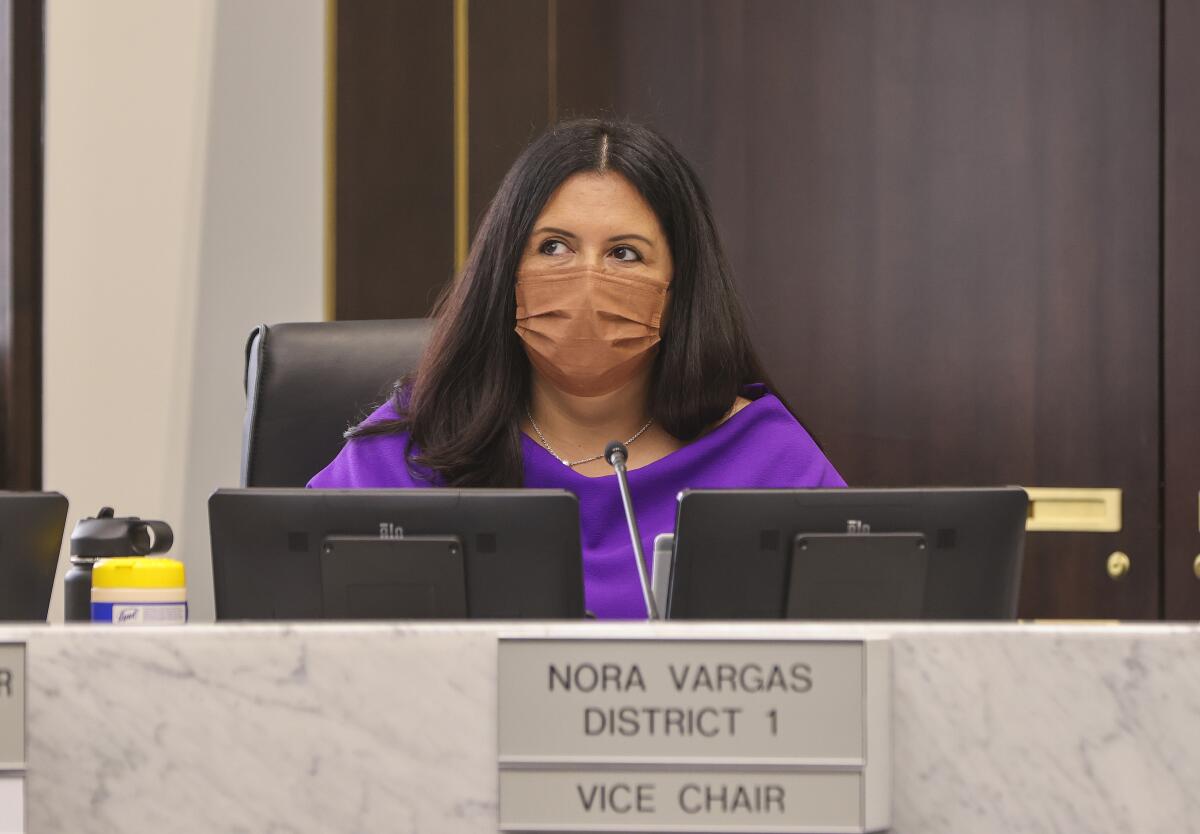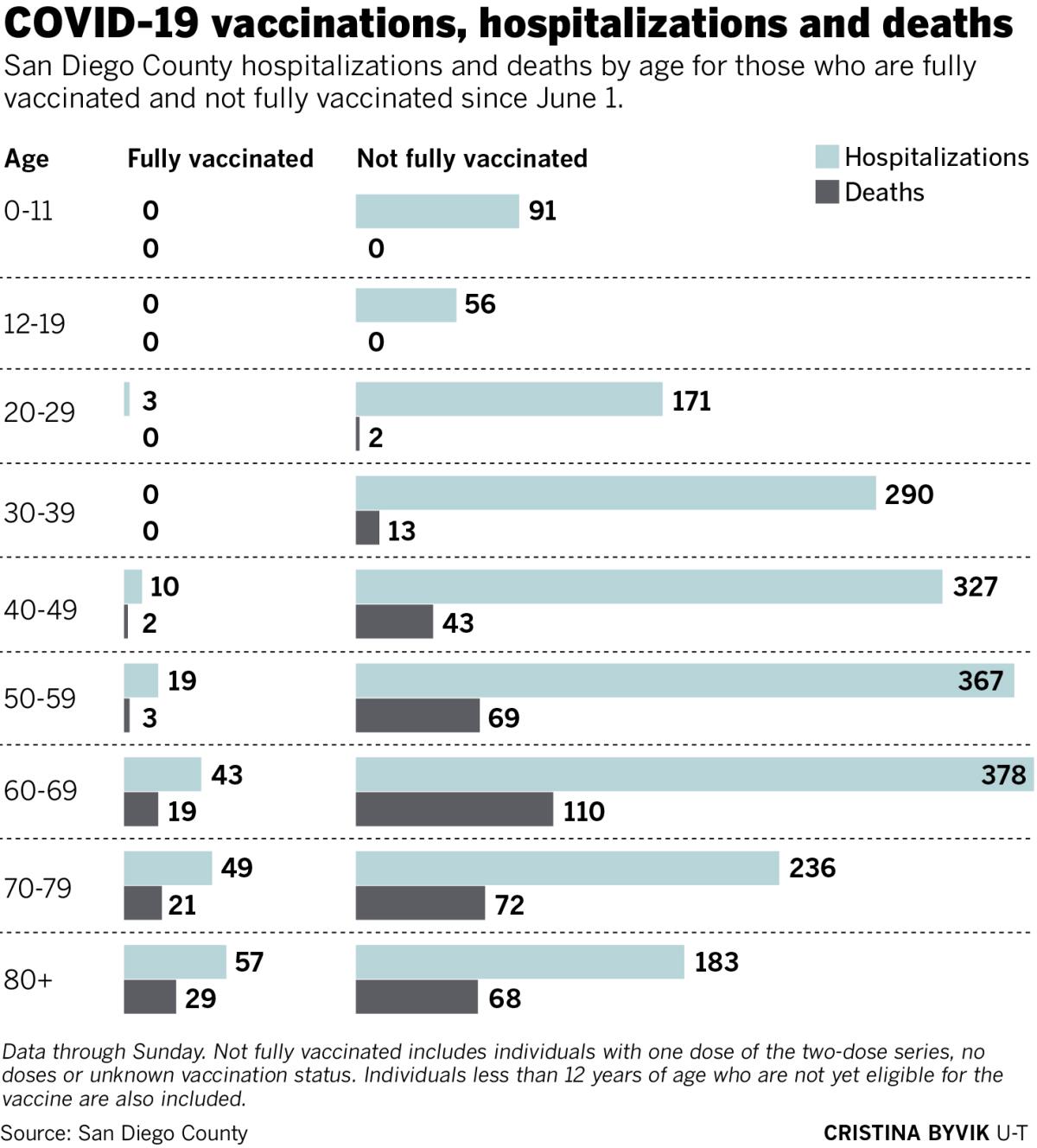Anti-vax anger boils over into racism, hate at county supervisors meeting

Public attacks turn more personal and nasty: this is ‘hate speech, not free speech’
Public comments made during the county’s COVID-19 updates have featured hours of angry yelling for months now, but statements made Tuesday crossed a particularly nasty line.
One of the nearly 70 people who spoke against vaccine mandates not only wished that three of five county supervisors would die or be killed, but also tossed in a racial slur against the region’s top public health official.
Supervisor Nora Vargas cut in during the comments, refusing to sit quietly during the diatribe that included body-shaming comments about her. When a racist comment was lobbed at Dr. Wilma Wooten, the Black director of the county public health department, Vargas couldn’t help but respond.
“You can call me fat all you want, but you are not allowed to say that to her,” Vargas replied.
Later, during board deliberations after hours of public comments were finished, Vargas drew a line between the right in a democracy to be heard and the indefensible words that came from the podium.
Hear more on our San Diego News Fix podcast:
“The comments today are hate speech, not free speech, and that needs to stop,” Vargas said.
Board chair Nathan Fletcher, who had stepped away from the dais temporarily while the brutal back-and-forth occurred, returned to demand a higher level of civility going forward.
“Some of you have legitimate points and fair points that deserve to be heard, but they are completely debased and completely erased with this for fun or sport mindset of how racist can I be, how rude can I be to the staff, how absurd can I be?” Fletcher said.
But it was clear that the comments the supervisors so roundly condemned resonated with many in the audience Tuesday. Cheers are clearly audible in the video recording of the meeting, which was streamed live on the Internet.
Fletcher had a few additional words for those who laughed and cheered.
“Everyone that cheers him on, you’re just as guilty,” he said. “The reality is, you can stand up here and say whatever you want, that’s your First Amendment right, but it’s disgusting, it’s vile, and it contributes nothing to what we’re doing here.”
The atmosphere at county supervisor meetings, especially those that feature COVID-related items, has featured comments from residents angry about how leaders have handled the pandemic since widespread restrictions started in 2020.
Many have publicly questioned everything from the validity of positive test results to the effectiveness and safety of coronavirus vaccines, prompting the county health department to recently launch its own misinformation website in an effort to rebut incorrect or misleading statements made during government meetings. But Tuesday’s meeting seemed to reach a new level of vitriol.
At one point, a person in the audience who repeatedly interrupted the public discourse was removed from the meeting chamber in the county administration building on Harbor Drive.
Much frustration has surrounded the county’s continued maintenance of the emergency status of the pandemic response, especially in times over the past two years where case totals have fallen and fewer people have been ending up in hospital beds with COVID-19.
County officials have often said that the emergency status votes are necessary to maintain access to state and federal funding for anti-COVID actions, but some, including supervisors Jim Desmond and Joel Anderson, have objected that it’s not right to keep calling the pandemic an emergency when the virus is more under control than it has been in the past.
Anderson and Desmond also voted against an item Tuesday that sought to “cure and correct” a previous board decision to require vaccination for all new hires made by county government. So far, the county board has not instituted a vaccination mandate for current employees; they retain the option of remaining unvaccinated and being tested regularly for coronavirus infection.
The board made the new-hire decision on a 3-2 vote during its monthly COVID-19 update on Oct. 5 with Fletcher adding it to a list of five other actions listed on the board’s agenda. But the board subsequently received a letter from La Mesa resident Mary Davis calling for the item to be rescinded, alleging that it violated public meetings law because it was not specifically listed on the agenda that must be posted at least 72 hours before a meeting.
Tuesday’s actions included a 3-2 vote to “cure and correct” the situation by rescinding the previous vote. But supervisors also affirmed the fact that Helen Robbins-Meyer, the county’s chief administrative officer, already has the ability to make vaccination a hiring condition.
Before the vote, county counsel Lonnie Eldridge was careful to state that the previous vote “was taken in compliance with the Brown Act,” referring to the common name of legislation that enshrined public meetings law.
“This item was taken to address the COVID-19 pandemic which was on the agenda as item No. 10,” Eldrige said. “Nonetheless, the Brown Act provides a no-fault method to re-do an item in case a question arises.”
The board’s decision to cure and correct its previous decision, he said, “is not evidence that the act was not followed.”
That take, though, is clearly open to some interpretation. It drew boos from the crowd Tuesday and some commentary from Monica Price, a legal fellow with the California First Amendment Coalition.
After looking at the agendas and a transcript of the comments made when the item was added at the last minute during board deliberations on Oct. 5, Price said it seemed clear that the spirit of the law would favor specifically listing the hiring change among the five other specific COVID-related items on the agenda for consideration.
The standard, she noted, is a “short description” of items to be voted on.
“A county employee or a member of the public who felt one way or another about this wouldn’t have known to show up for that meeting to make a comment,” Price said.
The county counsel’s assertion that the item did not violate the Brown Act because it was contained within a larger item broadly focused on COVID, she added, might not hold up if the demand for correction was denied and the matter went to court.

Though case law on this specific topic was thin, she said, there is a case where an appellate court found against a municipality that voted on California Environmental Quality Act requirements while considering what an agenda listed as a subdivision application. Though CEQA requirements were clearly part and parcel of the subdivision approval process, that wasn’t found to be enough because they weren’t explicitly mentioned.
“The court said ‘no, no, no, that agenda item is not sufficient notice that you’re going to talk about CEQA,” Price said.
Insisting that the act was not violated, she added, is common in such situations because, should such a violation be proven in court, government agencies can be required to pay the legal costs for the other side.
“Even if they don’t want to admit that they did anything wrong, I think the fact that they rescinded the item shows that they were at least a little nervous about it,” Price said.
Vaccination, meanwhile, moves forward with Rady Children’s Hospital scheduled to begin vaccination of kids age 5 to 11 Wednesday after approval from the U.S. Centers for Disease Control and Prevention granting approval Tuesday. The shots are by appointment only.
Get Essential San Diego, weekday mornings
Get top headlines from the Union-Tribune in your inbox weekday mornings, including top news, local, sports, business, entertainment and opinion.
You may occasionally receive promotional content from the San Diego Union-Tribune.












